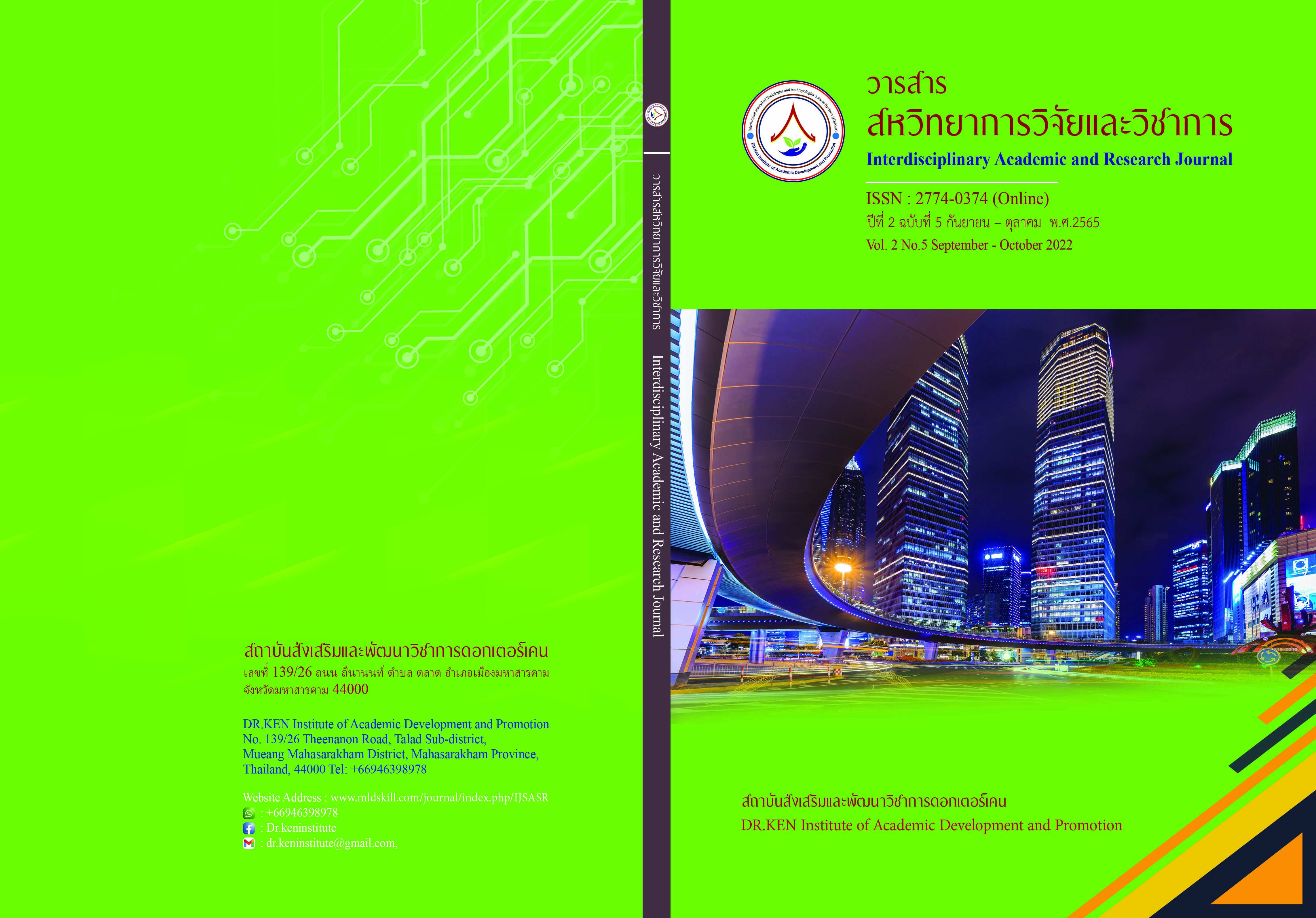A Study of Motivational Factors and Cultural Adjustment of Chinese Youth Studying or Living in Thailand: The Case of Nonthaburi
DOI:
https://doi.org/10.14456/iarj.2022.102Keywords:
Motivational Factors; , Cultural Adaptation; , Chinese Youth; , Chinese Youth in ThailandAbstract
The migration trend of the Chinese youth to Thailand is increasing nowadays. Such migration affects a wide range of changes in society, ethnicity, and culture. Cultural adaptation of the Chinese youth in order to live in a new and different society is therefore important. Thus, this article aimed to (1) study the motivational factors of the Chinese youth that come to study or work in Thailand, and (2) study the cultural adaptation of the Chinese youth in the area of adaptation problems, good adaptation practices, and the need for support during the cultural adaptation process. This research was mixed between quantitative research and qualitative research. The instrument for data collection was a questionnaire, created by the researcher, with a reliability index between 0.75 to 0.84. Data were analyzed by mean, standard deviation, frequency, percentage, and t-test statistics. The research results were found as follows; 1) In terms of incentives for studying or living in Thailand, it was found that the top three incentive factors for studying in Thailand were (1) the reputation of educational institutions in Thailand (2) quality of education in Thailand, and (3) living environment. 2) In terms of cultural adaptation of the Chinese youth, it was found that important cultural adaptation problems were (1) daily life (2) performance of work, and (3) food consumption. The first three adaptation practices were (1) associating with Thai friends, (2) working in groups with Thai friends, and (3) searching online databases. Regarding the need for assistance in cultural adaptation, the most important items were (1) training that provides information during the first period of studying or living in Thailand (2) an FAQ database for Q&A services, and (3) an advisory website.
References
กมลทิพย์ รักเกียรติยศ. (2560). การปรับตัวทางวัฒนธรรม การเรียนรู้ และการสื่อสารของนักศึกษาจีนในมหาวิทยาลัยราชภัฎเพชรบุรี. วารสารมนุษยศาสตร์และสังคมศาสตร์มหาวิทยาลัยมหาสารคาม. 36 (2), 60-72.
ณัฐิดา อุตมา. (2562). การปรับตัวทางวัฒนธรรม การเรียนรู้ และการสื่อสารของนักศึกษาจีนที่กำลังศึกษาต่อระดับปริญญาโท สาขาพลศึกษาในสถาบันการพลศึกษา วิทยาเขตชลบุรี ประจำปีการศึกษา 2560.วารสารวิชาการ สถาบันการพลศึกษา. 11 (1), 304-311.
ดวงทิพย์ เจริญรุกข์ เผื่อนโชติ และ พัชราภา เอื้ออมรวนิช. (2557). การปรับตัวของนักศึกษาจีนที่ เข้าศึกษาต่อในมหาวิทยาลัยราชภัฏธนบุรี. นิเทศศาสตรปริทัศน์ คณะนิเทศศาสตร์ มหาวิทยาลัยรังสิต. (18) 1, 75-86.
มัญชรี โชติรสฐิติ. (2556). การปรับตัวข้ามวัฒนธรรมของนักเรียนไทยในต่างประเทศ. วิทยานิพนธ์ ศิลปศาสตรมหาบัณฑิต: สถาบันบัณฑิตพัฒนบริหารศาสตร์.
สักกรินทร์ นิยมศิลป์. (2555). คลื่นลูกที่สี่: เอเชียตะวันออกเฉียงใต้กับการย้ายถิ่นของชาวจีนยุคใหม่ (The Fourth Wave: Southeast Asia and New Chinese Migrants). การประชุมสังคมวิทยาระดับชาติครั้งที่4 คณะกรรมการวิจัยแห่งชาติสาขาสังคมวิทยา สำนักงานคณะกรรมการวิจัยแห่งชาติ ร่วมกับจุฬาลงกรณ์มหาวิทยาลัย วันที่ 18-19 มิถุนายน 2555 ณ โรงแรมมิราเคิลแกรนด์, 1-16.
Castles, S. (1998). Globalization and migration: some pressing contradictions. International Social Science Journal, 50 (156), 179-186.
Cortina, J., Taran, P., & Raphael, A. (Eds.). (2014). Migration and Youth: Challenges and Opportunities. Retrieved June 16, 2017.[Online] http:// www.globalmigrationgroup.org
Everett S. Lee. (1966). A theory of migration. Demography, 3 (1), 47-57.
Giddens, A., & Sutton, P. (2009). Sociology. 6th. Cambridge: Polity.
Huguet, J. (2014). Thailand Migration Profile. Thailand Migration Report 2014.
Koser, K. (2007). International Migration: A Very Short Introduction. New York: Oxford
Songsirisak, P. (2018). CROSS-CULTURAL ADAPTATION OF CHINESE STUDENTS: PROBLEMS AND SOLUTIONS. Journal of Educational Research, Srinakharinwirot University. 13 (2), 221-233.
Roy, P. (1962). The measurement of assimilation: the Spokane Indians. American Journal of Sociology. 67 (5), 541-551.
Yakushko, O. (2008). Xenophobia: Understanding the roots and consequences of negative Attitudes toward immigrants. The Counseling Psychologist. 37 (1), 36–66.
Downloads
Published
How to Cite
Issue
Section
License
Copyright (c) 2022 ออมวจี พิบูลย์, วิมลวรรณ เปียยก

This work is licensed under a Creative Commons Attribution-NonCommercial-NoDerivatives 4.0 International License.
Copyright on any article in the Interdisciplinary Academic and Research Journal is retained by the author(s) under the under the Creative Commons Attribution-NonCommercial-NoDerivatives 4.0 International License. Permission to use text, content, images, etc. of publication. Any user to read, download, copy, distribute, print, search, or link to the full texts of articles, crawl them for indexing, pass them as data to software, or use them for any other lawful purpose. But do not use it for commercial use or with the intent to benefit any business.
















.png)


